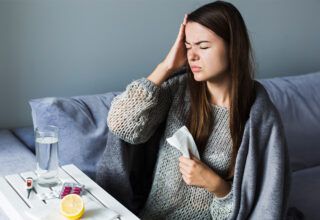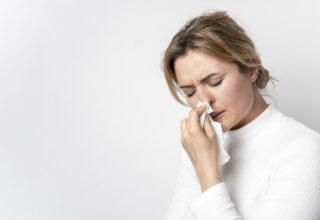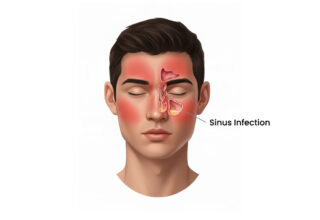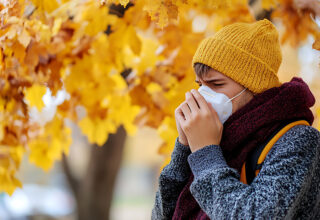If you have ever felt like you have a cold that just won’t go away— runny nose, itchy eyes, sneezing— but without the fever or body aches, there’s a good chance you have experienced hay fever. Despite its name it’s very rarely related to hay and isn’t really a fever.
It’s actually an allergic reaction. It is a common condition but for many people it’s a frustrating and recurring issue, especially during specific seasons.
Let’s learn about hay fever, what it actually is, why it happens, how it makes you feel, and what you can do to manage it.
What is Hay Fever?
Hay fever, also called allergic rhinitis, is a common type of allergy.
It’s an allergic reaction to a harmless outdoor or indoor substance that your body identifies as harmful (allergens)— like pollen, dust mites, mold spores, or pet dander. When you inhale these tiny allergens, your immune system reacts and releases substances like histamine which trigger your symptoms.
What are the Symptoms of Hay Fever?
Symptoms of hay fever can feel a lot like cold, but they’re usually triggered suddenly and don’t involve fever.
Common symptoms of hay fever include:
- Sneezing
- Coughing
- Blocked or runny nose
- Itchy, watery, or red eyes
- Itchy throat, mouth, nose, and ears
- Postnasal drip (mucus dripping down the back of your throat)
- Loss of smell
- Headache
- Extreme tiredness and fatigue
What Causes Hay Fever?
There are many outdoor and indoor allergens that can cause hay fever. Common triggers include:
- Tree pollen—common in early spring
- Grass pollen—common in late spring and summers
- Ragweed pollen—common in fall
- Fungi and mold spores—they thrive in damp and humid conditions and can be both seasonal and year-round
- Dust mites and cockroach droppings—present year-round
- Pet dander—can be a year-round irritant but symptoms often worsen in winters when homes are closed up and there’s limited ventilation
How to Manage Symptoms of Hay Fever?
There is no cure for hay fever, but you can take steps to manage your symptoms, especially when pollen levels are high.
What You Can Do:
- Dab a little petroleum jelly (like Vaseline) around your nostrils to trap the pollen before it enters your nose
- Wear wraparound sunglasses, face mask, and a wide-brimmed hat when going out, to help keep pollen out of your eyes, nose, and mouth
- After spending time outdoors, shower and change your clothes as soon as you come back
- Keep the windows and doors closed as much as possible to stop pollen from drifting indoors
- Vacuum regularly and use a HEPA filter in your vacuum cleaner for better allergen control
- Use a damp cloth to wipe surfaces and reduce dust and pollen build up
- Use pollen filters in your car’s air vents (if available)
What you Should Avoid:
- Don’t mow the lawn or walk on grass, as grass pollen is a major trigger
- Try not to spend too much time outdoors when the pollen count is high
- Avoid keeping fresh flowers in your house—they can carry pollen too
- Stay away from cigarette smoke as it can make your symptoms worse
- Try not to hang your laundry outside to dry—pollen can cling to clothes and bedsheets
- If possible, keep your pets outdoors or clean them regularly—they can bring pollen inside on their fur
Over-the-Counter Medications:
If your hay fever is bothering you, you can go to your local pharmacist. They can recommend effective over-the-counter treatments and help you choose right options based on your symptoms.
These options may include:
- Antihistamines like loratadine and cetirizine— to help reduce sneezing, runny nose, itching, and watery eyes. These are available in the form of tablets, eyedrops, or nasal sprays.
Some antihistamines make you feel drowsy, so talk to your pharmacist about the non-drowsy options
- Steroid nasal sprays—to reduce inflammation and congestion
- Decongestants—these help reduce nasal congestion and should only be used for short-term. They’re available in the form of oral decongestants like pseudoephedrine and nasal decongestant sprays like phenylephrine hydrochloride
- Eye drops— to help relieve red, itchy, and watery eyes caused by allergens
Prescription Medications:
For more severe and persistent symptoms, your doctor might prescribe:
- Stronger antihistamines or steroid nasal sprays
- Leukotriene inhibitors like montelukast
- Immunotherapy— allergy shots or under-the-tongue tablets to help build long-term tolerance to allergens
Note: Always contact your healthcare provider before starting any new medication, especially if you’re pregnant, lactating, have any health condition, or already using some medicines.
Can you Prevent Hay Fever?
There’s no definite way to prevent hay fever. All you can do is limit your exposure to the allergens that trigger your symptoms.
It is also helpful to take allergy medications as recommended by your doctor, in advance— before you’re exposed to the allergens.
Is Hay Fever Contagious?
No, hay fever isn’t contagious. It’s an allergic reaction, not an infection, so you can’t catch it from someone else. The sneezing and coughing may look like a cold, but hay fever is your immune system’s response to allergens, not a virus or bacteria.
When to See a Doctor?
If you have hay fever and your symptoms are getting worse or affecting your sleep, work, or daily activities—even after treating yourself with over-the-counter medications—it’s a good idea to check in with your doctor.
You should also consult with your doctor if you have any other condition like asthma or nasal polyp, that can worsen your symptoms of hay fever.
Final Thoughts:
Dealing with hay fever can be frustrating and exhausting. But the good news? There are many ways to manage your symptoms and take back some control.
Whether you lean towards natural remedies, over-the-counter medicines, or a bit of both, knowing what sets off your symptoms and avoiding those triggers can make a lot of difference.
If you’re having severe or persistent symptoms that are interfering with your daily activities, don’t hesitate to contact your doctor.








